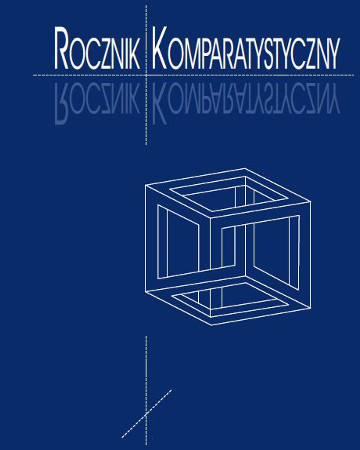





| Rok wydania: | 2013 |
| # | Tytuł | Liczba stron | Autorzy | Akcje |
|---|---|---|---|---|
| 1. |
The Slavic Barbarian in Adam Mickiewicz’s Paris Lectures* |
14 (11-24) | Michał Kuziak | Więcej |
| 2. |
Appelé à prendre la parole: The Parisian Romanticism of Adam Mickiewicz and George Sand |
14 (25-38) | Jared Warren | Więcej |
| 3. |
Annihilation or Revival? On the Binary Topos “barbaric vs. civilized” in Russian and Polish Poetry at the Beginning of the 20th Century* |
18 (39-56) | Ulrike Jekutsch | Więcej |
| 4. |
E.E. and the American Dream. Barańczak, Białoszewski, Sosnowski |
18 (57-74) | Ewa Rajewska | Więcej |
| 5. |
Jan Skácel and Adam Zagajewski: The Czech and the Polish Poet on the Civilization and the Barbarians |
14 (75-88) | Petra James | Więcej |
| 6. |
Mr Cogito Tells Crow about Spinoza but Crow Goes on Laughing: “Civilization” and “Barbarism” in Zbigniew Herbert’s Mr Cogito and Ted Hughes’s Crow |
19 (89-107) | Małgorzata Wesołowska | Więcej |
| 7. |
Larkin, Miłosz and the Pathos of Western Civilisation |
10 (109-118) | Piotr Karwowski | Więcej |
| 8. |
What We Learned From the British Barbarians |
18 (119-136) | Joanna Orska | Więcej |
| 9. |
Barbaric Poetry? The Challenges of Contemporary Civilization (A Comparative Polish-Belgian Study) |
22 (137-158) | Dorota Walczak-Delanois | Więcej |
| 10. |
Civilized/Barbaric? Changed Connotations in Indian Dalit Poetry |
14 (159-172) | Meenakshi Bharat | Więcej |
| 11. |
“Two Poets” in Czesław Miłosz’s Unknown Letters and Other Writings |
29 (175-203) | Marta Skwara | Więcej |
| 12. |
Recording an Oral Message. Jerzy Ficowski and Papusza’s Poetic Project in the Postcolonial Perspective |
28 (207-234) | Emilia Kledzik | Więcej |
| 13. |
Poems by Frank O’Hara and Allen Ginsberg Translated by Polish Poets. The Conflict between “Classicists” and “Barbarians”? |
20 (235-254) | Agnieszka Moroz | Więcej |
| 14. |
Translating Walt Whitman’s “Barbaric Yawp.” Introduction |
9 (255-263) | Ed Folsom | Więcej |
| 15. |
“Barbaric Yawp” in Swedish |
8 (265-272) | Anders Pettersson | Więcej |
| 16. |
“Barbaric Yawp” in German |
8 (273-280) | Vanessa Steinroetter | Więcej |
| 17. |
“Barbaric Yawp” in Dutch |
6 (281-286) | Katia Vandenborre | Więcej |
| 18. |
To Yawp, Or Not To Yawp: French Translators and Whitman’s Distinctive Idiom |
11 (287-297) | Éric Athenot | Więcej |
| 19. |
Italian Yawps |
5 (299-303) | Caterina Bernardini | Więcej |
| 20. |
Brazilian “Barbaric Yawps” |
8 (305-312) | Maria Clara Paro | Więcej |
| 21. |
Whitman’s “Barbaric Yawp” Sounded in Serbian* |
7 (313-319) | Bojana Aćamović | Więcej |
| 22. |
“Barbaric Yawp” in Russian |
5 (321-325) | Andrey Azov | Więcej |
| 23. |
“Barbaric Yawp” in Polish* |
8 (327-334) | Marta Skwara | Więcej |
| 24. |
“Barbaric Yawp” in Turkish |
4 (335-338) | Ayten Tartici | Więcej |
| 25. |
The Barbaric Soul: Lost in Translation. A Comment on the Hindi Translation |
5 (339-343) | Meenakshi Bharat | Więcej |
| 26. |
The Fifth International Whitman Week (28 May 2012–2 June 2012, Pobierowo, Poland) |
8 (347-354) | Diana Ismail | Więcej |
| 27. |
Around the World in 33 Articles? |
13 (357-369) | Katarzyna Bielawna | Więcej |
| 28. |
Life after Postmodernism |
15 (371-385) | Natalia Gendaj | Więcej |